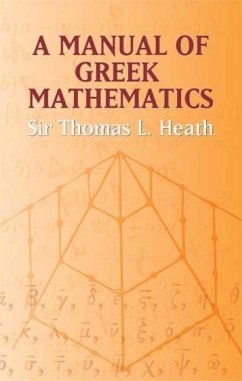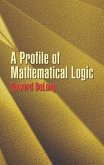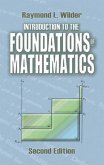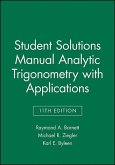Thomas L Heath
A Manual of Greek Mathematics
Thomas L Heath
A Manual of Greek Mathematics
- Broschiertes Buch
- Merkliste
- Auf die Merkliste
- Bewerten Bewerten
- Teilen
- Produkt teilen
- Produkterinnerung
- Produkterinnerung
This concise but thorough history encompasses the enduring contributions of the ancient Greek mathematicians whose works form the basis of most modern mathematics. Discusses Pythagorean arithmetic, Plato, Euclid, more. 1931 edition.
Andere Kunden interessierten sich auch für
![Selections Illustrating The History Of Greek Mathematics (Volume Ii) From Aristarchus To Pappus Selections Illustrating The History Of Greek Mathematics (Volume Ii) From Aristarchus To Pappus]() Selections Illustrating The History Of Greek Mathematics (Volume Ii) From Aristarchus To Pappus39,99 €
Selections Illustrating The History Of Greek Mathematics (Volume Ii) From Aristarchus To Pappus39,99 €![Selections Illustrating The History Of Greek Mathematics (Volume I) Selections Illustrating The History Of Greek Mathematics (Volume I)]() Selections Illustrating The History Of Greek Mathematics (Volume I)34,99 €
Selections Illustrating The History Of Greek Mathematics (Volume I)34,99 €![A Profile of Mathematical Logic A Profile of Mathematical Logic]() Howard DelongA Profile of Mathematical Logic20,99 €
Howard DelongA Profile of Mathematical Logic20,99 €![Evolution of Mathematical Concepts Evolution of Mathematical Concepts]() Raymond L WilderEvolution of Mathematical Concepts14,99 €
Raymond L WilderEvolution of Mathematical Concepts14,99 €![Introduction to the Foundations of Mathematics Introduction to the Foundations of Mathematics]() Raymond L WilderIntroduction to the Foundations of Mathematics23,99 €
Raymond L WilderIntroduction to the Foundations of Mathematics23,99 €![Bibliography and Research Manual of the History of Mathematics Bibliography and Research Manual of the History of Mathematics]() Kenneth MayBibliography and Research Manual of the History of Mathematics105,99 €
Kenneth MayBibliography and Research Manual of the History of Mathematics105,99 €![Analytic Trigonometry with Applications, 11E Student Solutions Manual Analytic Trigonometry with Applications, 11E Student Solutions Manual]() Raymond A BarnettAnalytic Trigonometry with Applications, 11E Student Solutions Manual86,99 €
Raymond A BarnettAnalytic Trigonometry with Applications, 11E Student Solutions Manual86,99 €-
-
-
This concise but thorough history encompasses the enduring contributions of the ancient Greek mathematicians whose works form the basis of most modern mathematics. Discusses Pythagorean arithmetic, Plato, Euclid, more. 1931 edition.
Hinweis: Dieser Artikel kann nur an eine deutsche Lieferadresse ausgeliefert werden.
Hinweis: Dieser Artikel kann nur an eine deutsche Lieferadresse ausgeliefert werden.
Produktdetails
- Produktdetails
- Verlag: Dover Publications
- Seitenzahl: 552
- Erscheinungstermin: 29. Dezember 2003
- Englisch
- Abmessung: 213mm x 137mm x 30mm
- Gewicht: 576g
- ISBN-13: 9780486432311
- ISBN-10: 0486432319
- Artikelnr.: 21814552
- Herstellerkennzeichnung
- Produktsicherheitsverantwortliche/r
- Europaallee 1
- 36244 Bad Hersfeld
- gpsr@libri.de
- Verlag: Dover Publications
- Seitenzahl: 552
- Erscheinungstermin: 29. Dezember 2003
- Englisch
- Abmessung: 213mm x 137mm x 30mm
- Gewicht: 576g
- ISBN-13: 9780486432311
- ISBN-10: 0486432319
- Artikelnr.: 21814552
- Herstellerkennzeichnung
- Produktsicherheitsverantwortliche/r
- Europaallee 1
- 36244 Bad Hersfeld
- gpsr@libri.de
Thomas Little Heath: Bringing the Past to Life Thomas Little Heath (1861-1940) was unusual for an authority on many esoteric, and many less esoteric, subjects in the history of mathematics in that he was never a university professor. The son of an English farmer from Lincolnshire, Heath demonstrated his academic gifts at a young age; studied at Trinity College, Cambridge, from 1879 to 1882; came away with numerous awards; and obtained the top grade in the 1884 English Civil Service examination. From that foundation, he went to work in the English Treasury, rose through the ranks, and by 1913, was permanent secretary to the Treasury, effectively the head of its operations. He left that post in 1919 at the end of the first World War, worked several years at the National Debt office, and retired in 1926. During all of that time, however, he became independently one of the world's leading authorities on the history of mathematics, especially on the history of ancient Greek mathematics. Heath's three-volume edition of Euclid is still the standard, it is generally accepted that it is primarily through Heath's great work on Archimedes that the accomplishments of Archimedes are known as well as they are. Dover has reprinted these and other books by Heath, preserving over several decades a unique legacy in the history of mathematical scholarship. In the Author's Own Words: "The works of Archimedes are without exception, monuments of mathematical exposition; the gradual revelation of the plan of attack, the masterly ordering of the propositions, the stern elimination of everything not immediately relevant to the purpose, the finish of the whole, are so impressive in their perfection as to create a feeling akin to awe in the mind of the reader." — Thomas L. Heath
1. Introductory 2. Numerical Notation and Practical Calculation 3.
Pythagorean Arithmetic 4. The Earliest Greek Geometry. Thales 5.
Pythagorean Geometry 6. Progress in the Elements Down to Plato's Time 7.
Special Problems 8. From Plato to Euclid 9. Euclid 10. Aristarchus of Samos
11. Archimedes 12. Conic Sections 13. The Successors of the Great Geometers
14. Trigonometry: Hipparchus, Menelaus, Ptolemy 15. Mensuration: Heron of
Alexandria 16. Pappus of Alexandria 17. Algebra: Diophantus of Alexandria
18. Commentators and Minor Writers Appendix. Indices.
Pythagorean Arithmetic 4. The Earliest Greek Geometry. Thales 5.
Pythagorean Geometry 6. Progress in the Elements Down to Plato's Time 7.
Special Problems 8. From Plato to Euclid 9. Euclid 10. Aristarchus of Samos
11. Archimedes 12. Conic Sections 13. The Successors of the Great Geometers
14. Trigonometry: Hipparchus, Menelaus, Ptolemy 15. Mensuration: Heron of
Alexandria 16. Pappus of Alexandria 17. Algebra: Diophantus of Alexandria
18. Commentators and Minor Writers Appendix. Indices.
1. Introductory 2. Numerical Notation and Practical Calculation 3.
Pythagorean Arithmetic 4. The Earliest Greek Geometry. Thales 5.
Pythagorean Geometry 6. Progress in the Elements Down to Plato's Time 7.
Special Problems 8. From Plato to Euclid 9. Euclid 10. Aristarchus of Samos
11. Archimedes 12. Conic Sections 13. The Successors of the Great Geometers
14. Trigonometry: Hipparchus, Menelaus, Ptolemy 15. Mensuration: Heron of
Alexandria 16. Pappus of Alexandria 17. Algebra: Diophantus of Alexandria
18. Commentators and Minor Writers Appendix. Indices.
Pythagorean Arithmetic 4. The Earliest Greek Geometry. Thales 5.
Pythagorean Geometry 6. Progress in the Elements Down to Plato's Time 7.
Special Problems 8. From Plato to Euclid 9. Euclid 10. Aristarchus of Samos
11. Archimedes 12. Conic Sections 13. The Successors of the Great Geometers
14. Trigonometry: Hipparchus, Menelaus, Ptolemy 15. Mensuration: Heron of
Alexandria 16. Pappus of Alexandria 17. Algebra: Diophantus of Alexandria
18. Commentators and Minor Writers Appendix. Indices.








